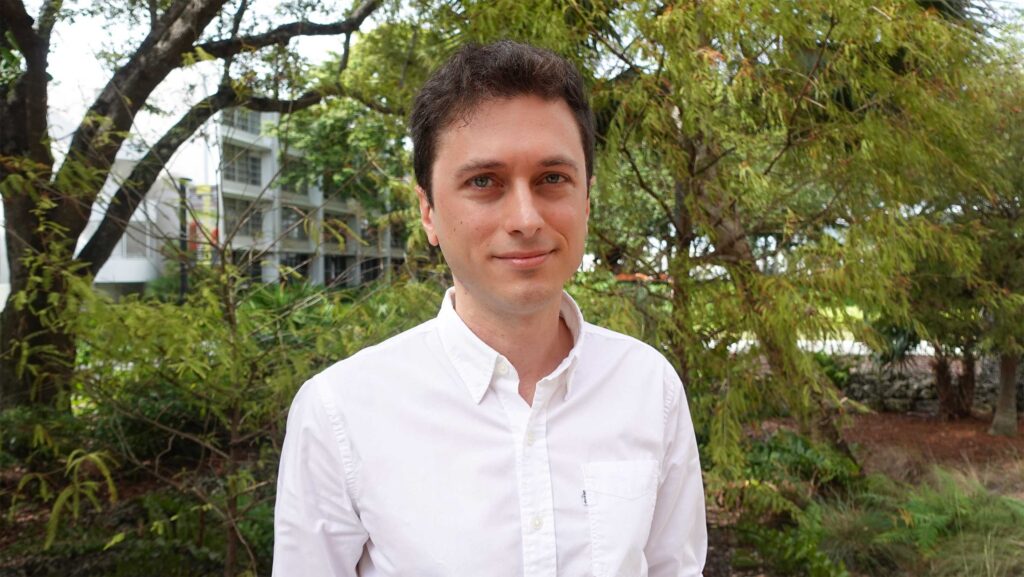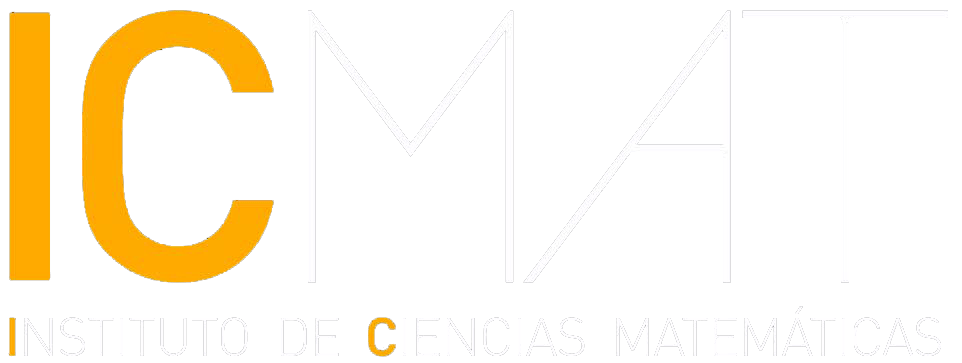Enhancing bridges between Spain and Latin America programme
Interview with Miguel Walsh (University of Buenos Aires, Argentina, CONICET), Latin American Research Award in Mathematics IMSA 2024 – Category: Young Mathematician. Salem Prize 2024, from the Institute for Advanced Study (IAS)

Miguel Walsh during his participation in Mathematical Waves Miami (USA). Image: Laura M. Iraola/ICMAT
Miguel Walsh is a specialist in ergodic theory and analytic number theory, areas to which he has made outstanding contributions. For this, he has just been awarded the prestigious Salem Prize 2024 by the Institute for Advanced Study (IAS), in Princeton, New Jersey (USA). Considered one of the most important prizes in the field of mathematical analysis, it has been awarded to Fields medallists such as Terence Tao (2000), Maryna Viazovska (2016) and Artur Avila (2006), among others. He shares this award with researcher Yiling Wang (IHES, Bures-sur-Yvette, France).
Walsh is currently a full professor at the University of Buenos Aires (Argentina) and a researcher at the National Council for Scientific and Technical Research (CONICET). He decided to return to his country after having worked at institutions such as the University of Oxford (UK) and American universities such as Princeton, Berkeley and the University of California at Los Angeles (UCLA).
It has been a year full of awards for the scientist: he began the year with the Latin American Mathematics Research Prize in the category of young mathematician, awarded by the Institute of the Mathematical Sciences of the Americas (IMSA) in Miami, with which the ICMAT has set up a collaboration programme. In September he also received the Umalca Recognition Award from the Mathematical Union of Latin America and the Caribbean.
These are in addition to other awards Walsh has received throughout his career, such as the Clay Mathematics Institute Research Fellowship (2014) and the MCA Award from the Mathematical Congress of the Americas in 2013. In 2014 he also received the Ramanujan ICTP Prize from the International Mathematical Union (IMU) and the International Centre for Theoretical Physics, becoming the youngest winner. In addition, he was an invited speaker at the International Congress of Mathematicians (ICM) in Rio de Janeiro in 2018.
Laura M. Iraola (ICMAT)
When did you know you liked mathematics?
When I was at school, mathematics didn’t interest me at all. However, I discovered that there were open problems that no one had ever been able to solve, but whose statements I could understand myself. This seemed very strange to me and I started to think about them, obviously I knew nothing about mathematics and everything I thought of was quite naive, but it was a very different experience from what school mathematics was for me. I had to try to come up with something and I found that very engaging. Then I came up with my own ideas, I found the sensation of thinking about these things spectacular and I knew it was what I wanted to do.
And you did it, you ended up doing research.
Yes, I was very lucky because I discovered that there was research in mathematics, a field that required other qualities, such as creativity, which I found much more interesting than what I thought mathematics was until then. I was so interested in that that I tried to do things quickly in my studies so that I could start research as soon as possible.
What is your area of research?
Right now, I am working on analytic number theory, which has to do with, for example, the distribution of prime numbers. Prime numbers are fascinating because they are so basic and sometimes thinking about them seems like a curiosity. But we know that the phenomena behind the behaviour of primes are connected to those in many parts of mathematics, even physics.
To understand all we want to understand about prime numbers, we are necessarily going to have to develop ideas and tools that affect other parts of mathematics. When those connections happen, perhaps, is one of the most interesting things in mathematics.
Which of your results would stand out?
That’s a difficult question, everyone has a different reason. I would say one result that I am happy about, but which is possibly the one I have talked about the least. It has to do with polynomials, something basic in mathematics, through which even the most complex things can be approximated, including natural phenomena. The more complicated the phenomenon, the more complicated the polynomial by which you have to approximate it. The purpose is to try to develop tools to better understand the behaviour of these polynomials when they become complicated. The result I got is a way to study how these polynomials interact with each other: if you have many polynomials at the same time, how do the solutions of these different polynomials interact with each other, how many solutions in common can they have? I have obtained results in that direction that may have applications in the future.
What are you currently working on?
I’m partly trying to continue what I’ve been doing with prime numbers, on multiplicative functions. The nice thing about that area is that the questions are deceptively simple. For example: if I look at all the numbers, from one to a hundred, from one to a thousand, from one to 10 000… how many of them are divisible by an even number of prime numbers and how many of them are divisible by an odd number of prime numbers? This sounds like a curiosity, but the problem is connected to many different aspects of mathematics. One of the things it connects with is the so-called Fourier analysis, a classic topic in mathematics. Through it, the problem to be studied is reinterpreted as a problem about waves. In the particular case of these questions about multiplicative functions, one of the contributions I made last year is to understand a little better what these waves are like that arise from studying problems about multiplicative functions. While we now understand a little bit more, there are still problems, which are fascinating and have been studied for 100 years, that have to do with understanding these waves even better. Continuing in that direction is one of the things I am working on now.
Mathematics research in Latin America
What do you think is the state of mathematics in Latin America?
Mathematicians in Latin America, really, in proportion to the funding they have, produce a lot. It’s impressive, but the funding you have, of course, affects basic things like the possibility of interacting with people in your field. And when you are young, even more so. Because of the long distances in Latin America and the lack of funding, young mathematicians on the continent have fewer possibilities than elsewhere. Even so, the level is very good.
And what do you think of events organised to unite and highlight Latin American mathematics, such as Matematical Waves Miami, promoted by IMSA (Institute of the Mathematical Sciences of the Americas)?
I find it very interesting, there are very good speakers and it is also an opportunity to meet colleagues from Latin America, so personally I find it very pleasant. If events of this nature continue to be organised, it will inevitably increase the interaction between Latin America and renowned international mathematicians who are also taking part in the event, so it will be a very positive influence on both sides.
Within the framework of this event, which held its first edition in January 2024, you have been awarded one of the Latin American Mathematics Research Prize in the category of young mathematician, what does it mean to receive this recognition?
It is very nice to receive it, particularly for two reasons: the fact that it aims to promote mathematics in Latin America and, on the other hand, because in recent years I have been lucky enough to be able to devote myself fully to the things I like most, and it is even nicer to receive some kind of distinction when you do what you like.
Enhancing mathematical bridges between Spain and Latin America
Since 2022, the ICMAT is part of IMSAC, a consortium of institutes and organisations that collaborate with the Institute of the Mathematical Sciences or the Americas (IMSA), an institution created with the objectives of promoting the advancement and communication of knowledge in mathematical sciences and fostering dialogue between Latin America, the United States and the rest of the world, with a special focus on the Hispanic community.
This collaboration is one of the ICMAT’s initiatives as part of its commitment to cooperate with academic institutions in Latin America for the development of research and education in mathematics. In this sense, last April, the ICMAT, with the support of IMSA, launched the Enhancing mathematical bridges between Spain and Latin America programme, one of the new actions launched thanks to the achievement of the Institute’s fourth accreditation as a ‘Severo Ochoa’ Centre of Excellence.
This content has been automatically translated. The original text may differ slightly.
